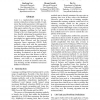Free Online Productivity Tools
i2Speak
i2Symbol
i2OCR
iTex2Img
iWeb2Print
iWeb2Shot
i2Type
iPdf2Split
iPdf2Merge
i2Bopomofo
i2Arabic
i2Style
i2Image
i2PDF
iLatex2Rtf
Sci2ools
127
click to vote
ACL
2006
2006
Approximation Lasso Methods for Language Modeling
Lasso is a regularization method for parameter estimation in linear models. It optimizes the model parameters with respect to a loss function subject to model complexities. This paper explores the use of lasso for statistical language modeling for text input. Owing to the very large number of parameters, directly optimizing the penalized lasso loss function is impossible. Therefore, we investigate two approximation methods, the boosted lasso (BLasso) and the forward stagewise linear regression (FSLR). Both methods, when used with the exponential loss function, bear strong resemblance to the boosting algorithm which has been used as a discriminative training method for language modeling. Evaluations on the task of Japanese text input show that BLasso is able to produce the best approximation to the lasso solution, and leads to a significant improvement, in terms of character error rate, over boosting and the traditional maximum likelihood estimation.
ACL 2006 | ACL 2007 | Lasso | Lasso Loss Function | Loss Function |
Related Content
| Added | 30 Oct 2010 |
| Updated | 30 Oct 2010 |
| Type | Conference |
| Year | 2006 |
| Where | ACL |
| Authors | Jianfeng Gao, Hisami Suzuki, Bin Yu |
Comments (0)

